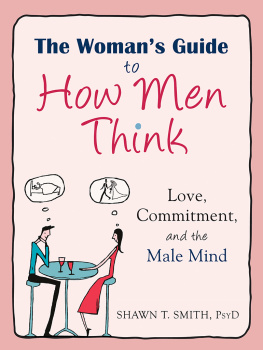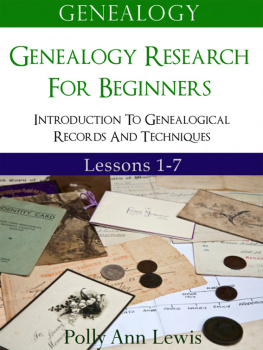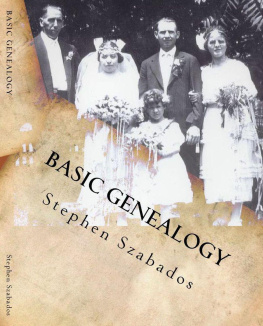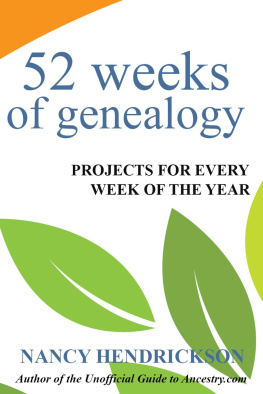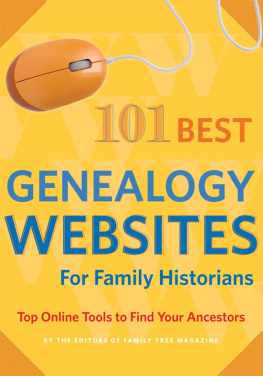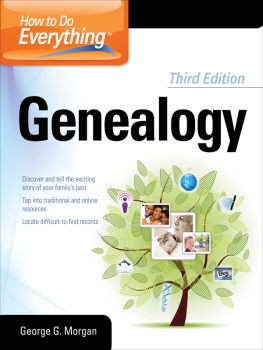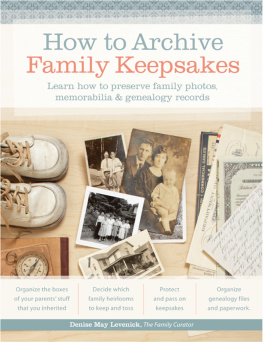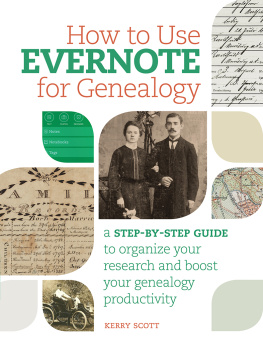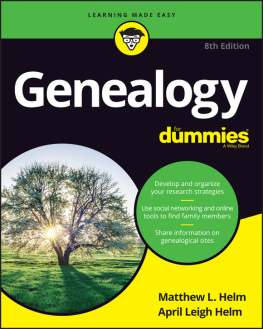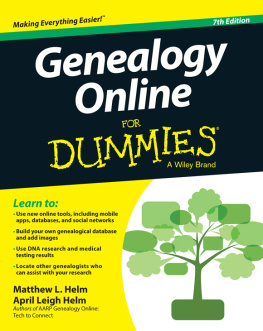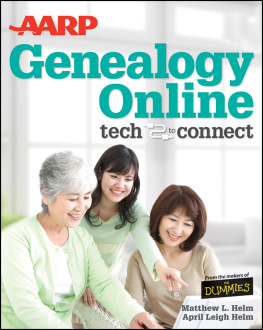Contents
Guide
organize your genealogy
STRATEGIES and SOLUTIONS for EVERY RESEARCHER
Drew Smith

CINCINNATI, OHIO
shopfamilytree.com
dedication
This book is dedicated to one of the most organized people Ive ever met: my husband, George G. Morgan.
CONTENTS
CHAPTER
Organizing Yourself
Prep your mind and body for the rigors of research with this guide to optimizing you and your habits.
CHAPTER
Organizing Your Space
Clean up your research space. This chapter describes the workspace arrangement and office supplies youll need to build a productive genealogy headquarters.
CHAPTER
Organizing Your Goals
Plan your way to genealogical success by using the techniques in this chapter to develop, manage, and evaluate realistic goals for your research.
CHAPTER
Organizing Your Notes and Ideas
Never lose a train of thought again. This chapter provides suggestions for how to preserve and sort information, from your random musings to crucial, irreplaceable interviews with family members.
CHAPTER
Organizing Your Files
Store your hard-earned research with this guide to organizing your physical documents and digital files.
CHAPTER
Organizing Your Research Process
Plan your way to genealogical success. This chapter covers how to manage your research workflow and use tools such as genealogy software programs to document and manage your projects from start to finish.
CHAPTER
Organizing Your Communication
Sort all those pesky e-mails and letters by using the tips in this chapter to optimize your mail-sorting system, e-mail inbox preferences, and even social media accounts.
CHAPTER
Organizing Your Online Research
Surf the web with confidence. This chapter discusses how to keep track of your files, searches, and family trees on the ever-growing Internet.
CHAPTER
Organizing Your Research Trips
Travel far and wide for your research with this guide to having efficient research sessions abroad, whether at a stateside library or an archive in the old country.
CHAPTER
Organizing Your Learning
Expand your genealogical knowledge. This chapter details how to choose and manage important genealogy lectures, conferences, webinars, and more.
CHAPTER
Organizing Your Volunteering
Give back to the community with this guide to pitching in with (and even running) genealogical-society meetings and projects.
Introduction
Why Do We Organize Anything?
As I sat down with the intention of dictating the first words of this book, I realized I was missing a piece of electronic hardware that allows me to connect my wireless headset to my desktop computer. This device, a dongle, is about the size of a USB flash drive. I had always kept this device in a special location in my desk drawer, but I couldnt find it when I looked for it there. I began looking in other drawers and on top of other furniture in the room, all to no avail. And the longer I looked, the more stressed I became. Without the dongle, I couldnt use the headset, and I would have to think of another way to dictate this book. The irony was not lost on me that my lack of organization was preventing me from beginning a book about organization!
Fortunately, it occurred to me to look behind my computer desk to see if the dongle had fallen. Sure enough, there it was on the floor, hidden between the wall and the woofer that provided the deep bass sounds for my computers speakers. I was back in business, and so I began this book.
What lessons can we learn from this experience? First, when were disorganized, we lose precious time. The time better spent searching for our ancestors, evaluating genealogical evidence, communicating with distant cousins, planning a research trip, learning new research techniques, or volunteering for a genealogy society is instead spent searching for misplaced equipment, notes, and documents. In some cases, we may even have to spend money to replace a missing itemmoney that could be better spent on new hardware, software, online subscriptions, books, magazines, webinars, conferences, and research trips.
Even setting aside the needless loss of time and money, the frustration we experience when were disorganized increases our stress level, which can cause physical and mental harm. As a result, our ability to be careful and productive genealogists is diminished, and we get less pleasure from our genealogical activities. But when were calm and organized, we can think more clearly and do better work.
Finally, when were organized, other people find it easier to work with us. Many of us have contacted another genealogist and asked for information, only to discover the other person has misplaced our e-mail or misfiled the document were asking about. When this happens, we question whether or not we want to work with this individual. An organized genealogist, however, can be a pleasure to work with.
Whats more, the pitfalls of unorganized genealogical research arent really that different from other activities. For example, misplacing a recipe or a kitchen utensil can make cooking difficult. Try gardening when you have lost the packet of seeds or the garden tool you need. Clearly, being organized has universal benefits.
Who Should Read This Book?
Most people can benefit from the organizational advice in this book, but let me discuss the most obvious groups. I hope this book will benefit new genealogists, as its often easier to adopt good habits when youre starting a relatively new activity than to change the way you have been doing things for years. I especially enjoy writing books and articles for beginning genealogists, and I still remember what it was like when I started this hobby. This guide will hopefully be the kind of book I would like to have read as a beginner looking to establish good habits early on.
The next audiences for this book are intermediate or advanced genealogists. While they may already use some of the techniques discussed here, many genealogists who have been working for a few years still look for ways to examine their procedures and how to improve them. And more experienced genealogists may find it useful to learn about organizing techniques they can share with beginning genealogists.
Even professional genealogical researchers are motivated to be organized in the work they do. Being disorganized can result in dissatisfied customers and a loss of potential income. Genealogists must organize not only the research itself, but also correspondence and other business-related paperwork. Many professional genealogists, whether or not they take clients, may also engage in speaking and writing. These activities involve meeting deadlines, traveling to speaking venues, corresponding with editors and societies, and filing contracts and invoices. All those activities require the organization well be discussing in this book; editors appreciate organized writers, and societies appreciate organized speakers.
Many genealogists will also get involved with local, state, and national genealogical societies, work that involves a certain level of organization. Volunteering to serve as an officer or as a member of a committee will involve dealing with schedules, correspondence, documents, and possibly travel. When youre organized, youll get more satisfaction out of serving a society, and the people working with you will appreciate how organized you are.
Finally, this book can benefit anyone who needs to work with large amounts of information. For instance, historians engage in many of the same activities as a genealogist, such as keeping track of documents needed to construct an historical narrative. Similarly, a journalist working on a story, like a genealogist, needs to organize (ideas, notes, and interview times and transcripts), communicate with sources and editors, and plan research trips. Although this book uses examples based upon genealogical research, the organizing principles laid out here apply to many types of activities.







